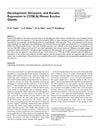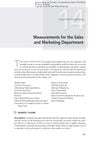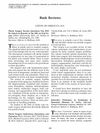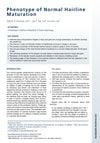 10 citations,
November 2018 in “Genetics in medicine”
10 citations,
November 2018 in “Genetics in medicine” Lack of cystatin M/E causes thin hair and dry skin.
 6 citations,
March 2011 in “Experimental Dermatology”
6 citations,
March 2011 in “Experimental Dermatology” Too much or too little selenium in the diet can cause hair loss and graying in mice.
 2 citations,
January 2013 in “Elsevier eBooks”
2 citations,
January 2013 in “Elsevier eBooks” The document explains the genetic causes and characteristics of inherited hair disorders.
 2 citations,
January 2023 in “Dermatology practical & conceptual”
2 citations,
January 2023 in “Dermatology practical & conceptual” COVID-19 diagnosis is linked to new or worsening hair diseases, with stress from the pandemic likely contributing.
 2 citations,
July 2012 in “InTech eBooks”
2 citations,
July 2012 in “InTech eBooks” People with alopecia areata often have thyroid autoimmunity.
 29 citations,
November 2011 in “Veterinary pathology”
29 citations,
November 2011 in “Veterinary pathology” The study found that mouse sweat glands develop before birth, mature after birth, and have specific keratin patterns.
 9 citations,
March 2018 in “European journal of dermatology/EJD. European journal of dermatology”
9 citations,
March 2018 in “European journal of dermatology/EJD. European journal of dermatology” A new mutation in the ST14 gene causes a rare skin and hair disorder in a specific family.
 10 citations,
November 2017 in “Journal of Investigative Dermatology”
10 citations,
November 2017 in “Journal of Investigative Dermatology” A mutation in the FAM83G gene is linked to skin and hair abnormalities in two related individuals.

The document explains how to measure sales and marketing success and warns about misusing these measurements.
 August 2003 in “International Journal of Cosmetic Surgery and Aesthetic Dermatology”
August 2003 in “International Journal of Cosmetic Surgery and Aesthetic Dermatology” The document recommends the reviewed medical books for professionals in cosmetic surgery, dermatology, and genetics.
 19 citations,
May 2006 in “Clinical and Experimental Dermatology”
19 citations,
May 2006 in “Clinical and Experimental Dermatology” Researchers found a new mutation causing total hair loss from birth.
 August 2014 in “Springer eBooks”
August 2014 in “Springer eBooks” Certain gene mutations can weaken the skin barrier and, when combined with environmental factors, lead to eczema and severe itching.
 December 2024 in “Indian Journal of Dermatology”
December 2024 in “Indian Journal of Dermatology” Dermoscopy is useful for diagnosing Atrichia with Papular Lesions in children without needing a biopsy.
 5 citations,
September 2013 in “The Journal of Dermatology”
5 citations,
September 2013 in “The Journal of Dermatology” Researchers found a new mutation in the HR gene causing hair loss and skin bumps in a Pakistani family.

Most postmenopausal women experience significant skin changes and various skin conditions.
 277 citations,
July 2011 in “Journal of the Dermatology Nurses’ Association”
277 citations,
July 2011 in “Journal of the Dermatology Nurses’ Association” The skin's layers protect, sense, and regulate the body's internal balance, but can be prone to cancer.
 5 citations,
February 2018 in “Experimental Dermatology”
5 citations,
February 2018 in “Experimental Dermatology” Scientists developed a way to isolate sweat glands from the scalp during hair transplants, keeping them alive for 6 days for research and cosmetic uses.
 27 citations,
June 2017 in “International Journal of Dermatology”
27 citations,
June 2017 in “International Journal of Dermatology” The study suggests that acne keloidalis nuchae is linked to conditions like pseudofolliculitis barbae, scalp infections, metabolic syndrome, and is more common in males with an average onset age of 25.4 years.
 7 citations,
May 2010 in “Journal of Cutaneous Pathology”
7 citations,
May 2010 in “Journal of Cutaneous Pathology” A new genetic area linked to a rare hair loss condition was found on chromosome 13 in a Chinese family.
 2 citations,
June 2017 in “Journal of biomedicine and translational research”
2 citations,
June 2017 in “Journal of biomedicine and translational research” Lychee fruit polyphenol (Oligonol®) may regulate genes linked to cell growth and inflammation in human scalp cells.
 19 citations,
August 2013 in “Facial Plastic Surgery Clinics of North America”
19 citations,
August 2013 in “Facial Plastic Surgery Clinics of North America” Children's hairlines change shape as they grow, with women often developing a widow's peak and men's hairlines becoming more convex and possibly balding at the temples, influenced by genetics and hormones.
 69 citations,
August 1999 in “Developmental biology”
69 citations,
August 1999 in “Developmental biology” The nude gene causes skin cell overgrowth and improper development, leading to hair and urinary issues.
 2 citations,
March 2016 in “InnovAiT”
2 citations,
March 2016 in “InnovAiT” PCOS is a common hormonal disorder in women, often involving menstrual issues and increased diabetes risk, managed through lifestyle changes and targeted treatments.
 10 citations,
February 2015 in “Clinics in Dermatology”
10 citations,
February 2015 in “Clinics in Dermatology” The document concludes that changes in eyelashes and eyelid skin can indicate various local and systemic diseases.
 30 citations,
July 2010 in “Experimental Dermatology”
30 citations,
July 2010 in “Experimental Dermatology” Polyamines are important for hair growth, but more research is needed to understand their functions and treatment potential.
 December 2013 in “Macedonian Journal of Medical Sciences”
December 2013 in “Macedonian Journal of Medical Sciences” Ovarian steroid cell tumors should be considered in adults with hirsutism and high testosterone, with surgery as the main treatment.
 July 1987 in “Reactions (Auckland)”
July 1987 in “Reactions (Auckland)” Oral minoxidil may slow male pattern baldness and cause body hair growth, but hair loss can happen after stopping it.
 September 2002 in “Fertility and sterility”
September 2002 in “Fertility and sterility” Female relatives of PCOS patients have a higher chance of showing PCOS symptoms.
 16 citations,
January 2003 in “Nuclear Receptor Signaling”
16 citations,
January 2003 in “Nuclear Receptor Signaling” Androgens and SARMs play a role in body mass, frailty, skin health, and hair growth, and are used in treating prostate cancer, acne, and hair loss, with potential for new uses and improved versions in the future.
 November 2022 in “Journal of Investigative Dermatology”
November 2022 in “Journal of Investigative Dermatology” The medicine Cyclosporin A might cause excessive hair growth by reducing a protein that controls hair growth.






























